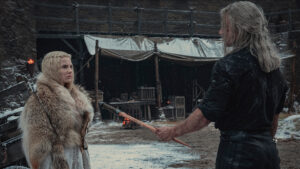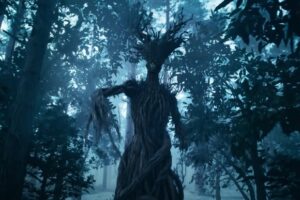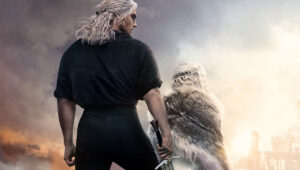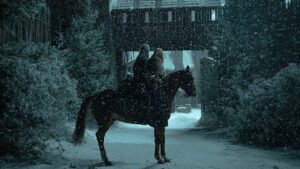SPOILERS FOR THE WITCHER: BLOOD ORIGIN AHEAD!
No point in delaying the inevitable, so here’s the harsh truth: I did not particularly care for The Witcher: Blood Origin. The live-action limited-series, set a thousand years before the events of The Witcher in a world populated by Elves, was originally intended to have a full six episodes, each an hour long, in which to tell the story of how Elves, humans, and fearsome monsters from Slavic folklore first collided during the Conjunction of the Spheres and were stranded on The Continent – a tale that could easily have been as epic and stirring as the first trailer promised. Alas! We shall never know if, in its original form, Blood Origin earned those descriptors, because at some point late in production two entire episodes were scrapped at Netflix’s bequest and their contents were hastily scattered across the remaining four. The spilled blood and guts of this once grand series are on full display in the unappealing final product, which has been served up as an appetizer to The Witcher season three.
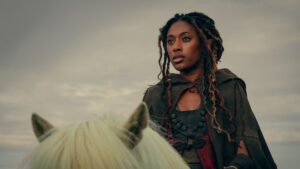
I have to imagine that Blood Origin‘s world, story, and characters were all fully fleshed-out in the episodes we lost forever, and that its commentary on “progressive reformers” who play at being revolutionaries while merely redecorating the inherently oppressive systems in which they remain caged was probably once effective, even timely. Perhaps the few, faint glimmers of originality still just barely visible in these four hectic episodes shone a little brighter before they were buried under layers of muck. Whatever the case, I can regretfully only pass judgement on what I actually watched: four hours of dull exposition, shallow political intrigue (my favorite fantasy trope, which I usually eat up), confessions of love and betrayals both rendered meaningless by the lack of any semblance of build-up, and a grand total of two or three minutes dedicated to the actual Conjunction of the Spheres, shoved in almost as an afterthought. Blood Origin is bad, but what’s worse, it’s incredibly boring.
And absolutely none of that is due to Henry Cavill suddenly leaving The Witcher, yet his name keeps popping up in eye-catching headlines for reviews of Blood Origin, and in a recent flurry of hyperbolic think-pieces predicting the quick death of the franchise. Without Cavill, critics write, The Witcher has nothing going for it. But what of the best-selling novels and critically-acclaimed video games, you ask? Tragically, they’re all meaningless now, without Cavill. And Blood Origin, a self-contained prequel which never starred Cavill in the first place but inconveniently comes hot on the heels of his departure, while his fans are still in mourning? Well, obviously it just shouldn’t exist. After all, what’s the point of anything Witcher-related if it doesn’t feature the second or third-best actor in the main series?
The visceral negative reaction from critics to the very concept of a Cavill-less Witcher prequel is…interesting, given that similar critiques were not leveled against Nightmare Of The Wolf, an animated Witcher prequel released last year that ended up with a 100% rating on Rotten Tomatoes while Blood Origin was stamped with a humiliating 33% rating. I’m not denying that there’s a difference in quality between the two, but the fact that Nightmare Of The Wolf was led by a white man while Blood Origin has a diverse ensemble cast spearheaded by a Black woman cannot be entirely discounted. Professional critics know exactly what they’re doing by attributing Blood Origin‘s faults to the absence of a white male lead; they’re trying to get clicks from the recently riled-up group of embittered book and game purists who believe, without any proof for their claims, that Henry Cavill walked away from The Witcher in protest of changes to the lore – including increased representation.
And sure, Cavill’s name is easy clickbait, but it’s not like Blood Origin doesn’t have a stacked cast of its own. Academy-Award nominee Minnie Driver provides her enchanting voice to the role of The Narrator, a nameless yet powerful Elven sorceress who even appears briefly in both the first and last episodes alongside Joey Batey, returning as the immensely popular bard Jaskier in a small but crucial role that allows him to once again belt out a catchy, profanity-laced song over the closing credits. And among Blood Origin‘s main cast stands the legendary Michelle Yeoh, TIME Magazine‘s 2022 Icon of the Year who stands perfectly positioned to become a first-time Academy Award nominee and winner in the new year for her starring role in the wildly successful sci-fi dramedy Everything Everywhere All At Once.

Yeoh’s character in the Witcher universe, a darkly humorous Elven warrior named Scían, may not earn her any Emmy Awards buzz (you want to receive recognition as an actor and be in a big-budget escapist fantasy, your best bet is still Westeros), yet nor is she reduced to her skill with a sword. Make no mistake, her fast-paced action scenes are a highlight of each episode, but something that I think casting directors often fail to take into consideration is that Yeoh can be a true team-player until you throw her into a fight opposite a relatively inexperienced combatant: and this is something that comes across clearly in the brief glimpses we catch of Scían off the battlefield, at peace, bickering with her traveling companions or joining in their merrymaking. Heck, I’d even argue that Yeoh ought to be invited to jump onboard the main series (one of the perks of playing an immortal Elf is that you can just do that), if she’d be open to it after the poor reception to Blood Origin.
The rest of the cast is also quite good, but with over a dozen major characters squeezed uncomfortably into these four episodes it’s impossible for them all to make an equally strong impression. Sophia Brown does so, proving particularly convincing as a good-natured bard named Éile whose songs inspire uprisings wherever she goes (shoutout to lyricist and composer Bear McCreary, whose score for the series is beautiful, with heavy Celtic influences), and Mirren Mack brings a unique ethereal swagger to the role of Empress Merwyn, though to be fair she receives considerable support from her breathtaking wardrobe of haute couture gowns (including several pieces designed by Iris van Herpen) and quirky hairstyles, which change from scene to scene. But the breakout star is Francesca Mills as Meldof, a foul-mouthed queer Dwarf whose memorable introductory scene convinced me to binge-watch episodes two through four despite all my reservations about the series.
Unfortunately, you will have to sit and suffer through the entire first episode if you want to meet Meldof, and that is a labor-intensive task I can’t in good conscience recommend to anyone just looking for a fun escapist fantasy to throw on, unless you know going in that you’ll be bombarded with solid blocks of expository dialogue in practically every scene and shouldn’t expect to catch anyone’s names amidst all the very serious discussion of peace treaties and food shortages until somewhere around the forty-minute mark (and that is being extremely optimistic). Look, I’ve enjoyed badly-written fantasy stories in the past. I have even put some out into the world. And that’s why I sat through Blood Origin‘s first episode praying that something so riotously bad would happen that I could at least have fun with the series. I didn’t expect it to be a tough ask of a franchise notable for putting an amusingly gory twist on classic fairytales.
Even in terms of production design and creature design, two areas in which The Witcher has always stood out from the competition, Blood Origin plays it safe, opting for dull familiarity over bold swings of its own (say what you will about The Rings Of Power, it was unmistakably different from Peter Jackson’s The Lord Of The Rings in every possible way, and I appreciate that even more now). The Continent pre-Conjunction of the Spheres, though quite literally shiny and new on the surface, is actually depressingly similar to the Continent of Geralt’s time, as we soon discover. Elves are just humans with pointier ears: they even violently oppress all the same marginalized groups that will still be oppressed a thousand years later, including women, queer people, Dwarves, and just about anyone in a lower social class than their aggressively elitist aristocrats and monarchs, who are also imperialists to boot. Every unique aspect of Elven culture and cosmology that seems worth exploring is brushed aside. Elven magic is loosely-defined and, whenever wielded onscreen, shockingly generic; lightning, fireballs, and the like. Balor’s Beast, the first monster on the Continent, evaporates its victims bloodlessly as part of a general effort to tone down the series’ violence that only reduces the stakes lower than they already were.
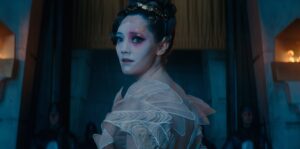
I have few kind words left for the series myself, though as always, nothing but support and positivity for those who genuinely adored it – especially those who simply enjoyed the representation, including one of the franchise’s first significant deaf characters and its first queer couple. The online discourse around Blood Origin has left me in this weird place where I feel strangely inspired to defend the series despite everything about it that I did not like, and I suspect it’s because so many purists, Henry Cavill fans, and straight-up bigots have been seizing upon this opportunity to try and bring the whole franchise down. I for one do not want that to happen. I enjoy the main series immensely, and I’m sure I would have enjoyed Blood Origin too, if Netflix hadn’t intervened to ensure that there was nothing left for anyone to enjoy. Hopefully, there is a future for some of these characters in The Witcher moving forward (well, we already know of one or two who will return, but I’m really only referring to Scían, Éile, and Meldof), so we can leave this disappointing chapter in the past while preserving the few parts of it that actually worked.
Series Rating: 4/10
